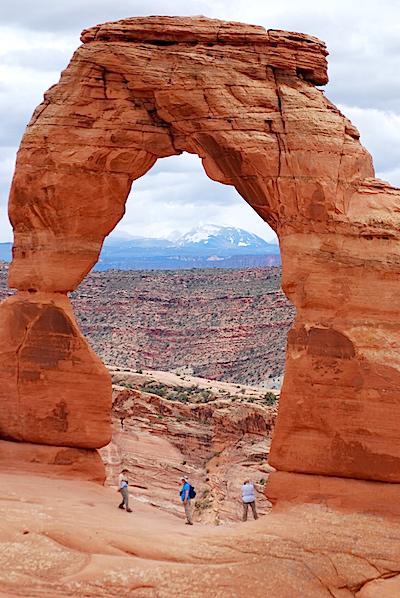
Limited parking will be available at the Delicate Arch/Wolfe Ranch parking area in Arches National Park from March through April/Kurt Repanshek
There will be limited parking at Delicate Arch in Arches National Park beginning in March and running through April as work begins to expand the parking lot.
The decision to enlarge the parking area was made in response to overcrowding and parking on the shoulders of the road leading to the Delicate Arch/Wolfe Ranch parking area. Phase two of the project will take place in June or July over approximately one week and focus on paving and striping of the expanded parking area.
The trailhead will remain open with limited parking Monday through Thursday and be fully open Friday, Saturday, and Sunday.
Expansion of this parking lot is the first step in implementation of planned congestion-management strategies outlined in the Delicate Arch/Wolfe Ranch Site Plan.
Under the expansion plan, nearly 2,000 visitors a day will be able to access Delicate Arch and the Wolfe Ranch via the parking area, according to planners. But since the expansion plan is envisioned only to accommodate traffic that currently parks along the road, park officials don't expect an overall increase in the foot traffic to Delicate Arch.
Implementation of a reservation system will only occur as a separate future planning effort, one in which the NPS will engage with partners, agencies, and the public in determining the best way to design and implement such a system.
While parks such as Acadia, Zion, Bryce Canyon and Rocky Mountain have turned to shuttle bus systems to help manage traffic and congestion, the staff at Arches concluded that that was not a reasonable solution for their park.

The cabin at Wolfe Ranch shows how hardy early homesteaders in the area were/Kurt Repanshek



Comments
And therein lies the problem.
Its just grass outside the park but it's sensitive grass inside the park, I see.
Indeed, therein DOES lie the problem. Thank you for acknowledging that. Now, what is the best way to administer these lands with sensitivity in place? Right there is the root of a whole lot of controversy. It's much too easy to simply take shots at the people who find themselves charged with responsibility for making decisions and quite another to try to understand why they may be forced by circumstances beyond their immediate control to try to make the best decisons they can at the time.
And because I'm not sure where else to put this, here are a couple of proposed bills in Congress from this morning's Legislative Activities Report that look like they could be some serious problems for public lands. Whether we agree or disagree isn't important. What is really important is that we are aware of them and make an effort to keep track of what's happening and to learn more about things like this so we may either support or oppose them by contacting our Congress critters to voice our opinions. Talking about them with friends is a good idea, too. We need to try to make more people aware of what's being done to the lands we all own as Americans.
Thanks Kurt, I wasn't aware of this program.
Dr. Runte seems to have it right (and he's certainly right about Abbey). Why is a slightly longer bus trek a problem? Yes, it would cost more. That's a problem you either choose to solve or choose not to solve. I took a 14-hour bus trip in Denali, and it was one of the best days I ever had in a national park.
Since you seemed to have missed the point, it isn't that "all the park is sensitive" thats the problem, its your opinion that "all the park is sensitive" that is the problem. The notion that by merely naming a piece of property a National Park every inch is magically transformed into sancrosant land is that kind of absolutism that turns many people away from the environmental movement.
In other words, EC, if a robber were to enter your house, you would only shoot him if he came into the bedroom. Merely the notion that naming it your house would of course have nothing to do with it. It's that kind of absolutism that drives "many" robbers nuts.